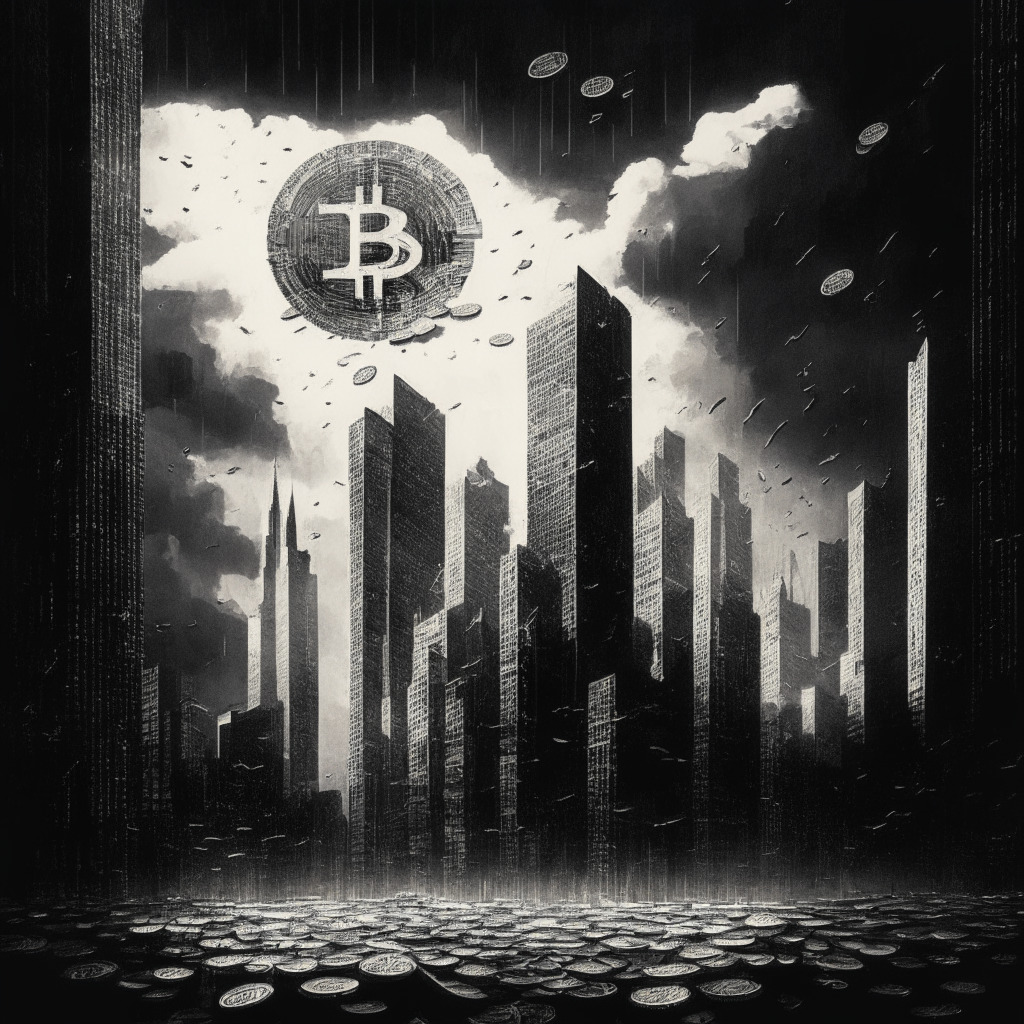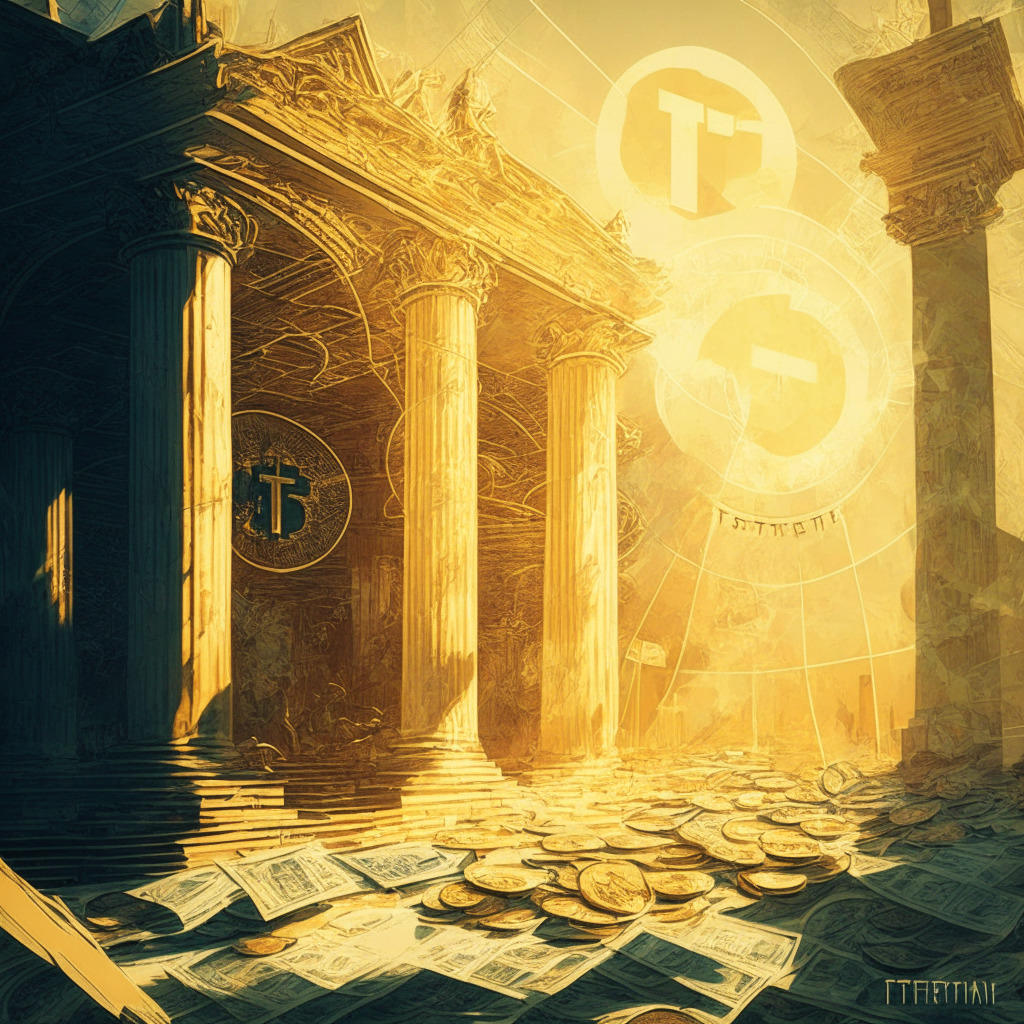North Carolina’s House of Representatives unanimously passed a bill prohibiting state agencies from accepting central bank digital currency (CBDC) payments, expressing concerns about potential weaponization and political manipulation of a digital dollar. This decision highlights the polarizing debate surrounding CBDCs in the United States, as lawmakers weigh these risks against potential financial benefits.
Search Results for: us treasury
Bitcoin and Gold Thrive Amid US Banking Crisis: A Tipping Point for Decentralized Assets?
Bitcoin surges above $29,000 as investors seek alternative assets amidst concerns over the ongoing US banking crisis. Gold hits new all-time highs while the banking sector’s perceived stability is debated, making decentralized assets more attractive for wealth preservation.
WallStreetBets Token Plummets 90%: Trust, Insider Sales & Recovery Prospects
The WallStreetBets token experienced a shocking 90% drop within 24 hours due to an insider selling off a significant portion of WSB tokens. This prompted a chain reaction with other token holders also dumping their holdings, contributing to the severe price collapse. The situation raises concerns about project safety and trustworthiness, emphasizing the volatile nature of cryptocurrency markets.
UK’s Rise as a Crypto Powerhouse: Pros, Cons, and the Future of Blockchain Technologies
The UK is emerging as a leading crypto hub with its robust financial infrastructure and supportive policymakers. London has been recognized as one of the best cities for crypto businesses, and the country’s government emphasizes the importance of a central bank digital currency and aims to lead in Web3 and metaverse advancements.
US Debt Default: A Catalyst for Bitcoin’s Surge or Global Economic Fallout?
Geoff Kendrick, head of forex research at Standard Chartered, believes that a US debt default could trigger a massive surge in Bitcoin’s value by $20,000. Cryptocurrency enthusiasts argue that Bitcoin’s deflationary nature and decentralized attributes position it as a safe haven during uncertain market conditions. However, the broader impact of a US default on the cryptocurrency market continues to be debated.
Debt Default Fears & De-Dollarization: Russia’s Stance on the Shaky US Economy
Russia closely monitors the US economy amid debt default concerns and warnings by Treasury Secretary Janet Yellen. The ongoing crisis highlights economic system weaknesses, prompting countries like Russia to explore alternate solutions such as de-dollarization efforts and a potential common BRICS currency.
Stagflation Looming or Recovery Flourishing? Schiff vs. Krugman on the US Economy’s Future
Economist Peter Schiff warns of stagflation in the U.S. economy, combining high unemployment and inflation, while Paul Krugman claims a “remarkably fast and essentially complete job market recovery.” Schiff’s concerns raise questions about the job market’s true recovery and potential consequences of sustained inflation on financial stability.
Crypto Mining Tax: Balancing Environmental Impact and Industry Growth
The Biden administration proposes a 30% tax on crypto mining firm’s energy costs, aiming to counter environmental pollution, higher energy prices, and increased greenhouse gas emissions. However, this industry-specific penalty could impact profits and faces resistance from congressional Republicans.
Bitcoin’s Battle at $28,000: Can BTC Hold On Amid Banking Crisis and Weakening USD?
Marcel Pechman explores Bitcoin’s $28,000 support amid its recent failure to break $30,000 resistance, leveraging impact on price, and U.S. banking issues affecting the digital asset. Various indicators suggest opportunities for both bulls and bears, as well as potential long-term benefits for Bitcoin in light of a weakened U.S. dollar.
US National Security Policy: Economic Disruptions and the Search for Balance
US national security policy faces criticism from international analysts for causing global economic disruptions and negatively impacting supply chains. Experts argue that these policies prioritize national security over essential issues and politicize trade, ultimately stifling other nations’ developmental rights. Constructive economic relationships are crucial for a balanced approach to national security.
Impending US Debt Default: Impact, Uncertainty, and Urgent Bipartisan Efforts
U.S. Treasury Secretary Janet Yellen warns of a potential debt default by June 1, urging Congress to address the issue. A default could lead to severe economic hardships, damage global leadership, and impact national security. The May 9 bipartisan talks hold the key to understanding the urgency and potential repercussions, emphasizing the need for Congress to find a solution.
UK’s Proposed Crypto Regulatory Framework: Key Debates and Industry Insights
The UK’s HM Treasury recently closed its consultation period on the proposed crypto asset regulatory […]
Poloniex Pays Millions in U.S. Treasury Settlement: Costly Compliance Lesson for Crypto Exchanges
In a recent development, cryptocurrency exchange Poloniex has agreed to pay a hefty sum of […]
DeFi Tax Dilemma: UK Seeks Public Opinion on Crypto Lending and Staking Regulation – A Charming Tussle between Innovation and Taxation
The United Kingdom is poised to tackle the tax treatment of decentralized finance (DeFi) lending […]
Defying Sanctions: Ethereum’s Tornado Cash & The Power of Crypto Resilience Amid Controversy
Despite facing US Treasury Department sanctions in August 2022, Tornado Cash has reportedly circulated $77.35 million worth of assets on Ethereum mainnet over the last month, according to blockchain intelligence firm, Arkham. The US allegations pertain to the platform’s use by North Korean hacker group, Lazarus Group, for money laundering. After an initial slump, Tornado Cash’s current total volume locked stands at $187.9 million.
Shadows Over Crypto: Fentanyl Sanctions, Regulatory Barriers, and the Future of Bitcoin
Bitcoin saw a slight downturn recently amid challenges such as the US Treasury’s move to outlaw cryptocurrency wallets and a crackdown on illicit substances like fentanyl. Additional regulatory barriers in the US are hindering crypto innovation, leading to concerns over future Bitcoin prices and investor sentiment.
Sanctioned Wallets and Blockchain’s Crime Deterrence: Navigating Regulation and Innovation
“The US Treasury recently sanctioned an Ethereum wallet linked to illicit fentanyl trafficking, underlining how blockchain technology can help curb illegal activities. Despite its anonymity, the crypto world can be vulnerable to exploitation by nefarious entities. While some see increased scrutiny as encroachment on privacy rights, without regulation, the blockchain could become a haven for miscreants.”
Emerging Blockchain Regulations: A Necessary Evil for Future Prosperity?
The US Treasury and IRS are planning new regulations on digital asset brokers to achieve higher taxpayer compliance. Starting in 2025, they’ll require information about profits, losses, and gross proceeds from cryptocurrency transactions. However, this regulatory step could inadvertently limit the innovation offered by blockchain technology.
Navigating the New Taxation Pathway for Crypto: Benefits, Challenges, and Unresolved Questions
The US Treasury Department has defined centralized crypto exchanges and certain wallet providers as “brokers”, tying them with tax-reporting responsibilities. This response to the 2021 Infrastructure Investment and Jobs Act intends to bring clarity on taxation of digital assets. However, decentralized exchanges, miners and issues of individual privacy still remain in a grey area.
Crypto Bill Debate: Balancing Investor Protection and Market Innovation
Rep. Maxine Waters seeks input from the US Treasury Department and the SEC on the potential impact of the latest crypto bill proposed by Republicans. She questions the bill’s effectiveness in protecting investors, changing the roles of the SEC and Treasury in the crypto market, and its possible threat to financial market stability. The outcome could significantly shape the future of crypto businesses and industry-wide regulations.
Digital Dollar: Evaluating CBDC Benefits, Risks, and Privacy Concerns in the Financial Landscape
The US Treasury explores the potential of a central bank digital currency (CBDC) for improving payment efficiency and financial inclusion. However, risks, privacy concerns, and design decisions could impact benefits. Careful design and implementation are crucial for the digital dollar’s future.
Bitcoin’s Struggle with $25K Resistance Amid Economic and Regulatory Uncertainty
Bitcoin’s narrow trading range has investors closely monitoring futures contract premiums and hedging costs, amid uncertainties regarding the Federal Reserve interest rate decision, US Treasury issuances, and the crypto regulatory environment. The recession risk for the U.S. economy further dampens demand for risk-on assets like Bitcoin.
Balancing Financial Security and Privacy: The Tornado Cash Sanctions Debate
The Blockchain Association supports Coin Center’s lawsuit against the US Treasury over its sanctions against Tornado Cash, arguing that the sanction raises regulatory and constitutional concerns. The case outcome could set a precedent for privacy-protecting services in the digital asset industry, emphasizing the need to balance financial security and individual privacy.
Crypto Market Decline: Asia Trading Hours Impact and Future Predictions
The global crypto market experienced a decline, with Bitcoin and Ethereum dropping 2%. Investors have been liquidating holdings as Bitcoin’s price closes 8% lower for the first time this year. Despite bullish outlooks, a short-term decline is expected due to a debt ceiling deal prompting a T-bill issuance from the US Treasury Department.
Debt Ceiling Deadline Hovers over Crypto Markets: The Impact on Bitcoin and Safe Investment Strategies
US Treasury Janet Yellen acknowledges financial market stress due to debt ceiling deal uncertainty, with potential dire consequences if a default occurs. Market analysts suggest that despite potential debt default, Bitcoin’s price spike may not happen as anticipated, calling for cautious investment strategies.
G7 Summit, Biden’s Disapproval & Crypto: Debating Tax & Regulation in Uncertain Times
During the G7 summit, President Biden criticized a debt deal for protecting wealthy tax cheats and crypto traders, while US Treasury Secretary Janet Yellen warned of catastrophic consequences if an agreement isn’t reached. This highlights ongoing tensions between supporting the expanding crypto market and ensuring fair responsibility, as the US debt ceiling deadline approaches and the future of crypto regulation remains uncertain.
Tether’s $4.5B Bank Withdrawal: Reducing Risk & Boosting Crypto Stability
Tether Holdings strategically reduced bank deposits by 90%, withdrawing $4.5 billion and increasing holdings in US Treasury bills. This resulted in an 85% backing for USDT through cash and short-term deposits, while improving transparency and demonstrating the potential of stablecoins in the crypto space.
Crypto Markets Stagnate Amid Regulatory Uncertainty and Banking Crisis Concerns
Cryptocurrency markets have been trading within a narrow range due to regulatory uncertainty, primarily in the US. Investors await clarity on rules for digital assets and the US Treasury’s plan for addressing the banking crisis. Professional traders do not predict a crypto price crash but emphasize diligent research and risk assessment in volatile markets.
Poloniex Pays $7.6M Settlement: Sanctions Compliance Challenges in Crypto World
The US Treasury’s OFAC announced that crypto exchange Poloniex will pay $7.6 million to settle claims for allowing users from sanctioned nations to trade digital assets. Between 2014 and 2019, Poloniex processed transactions for customers in sanctioned regions, highlighting challenges crypto businesses face concerning sanctions compliance.
Hefty Penalties on Crypto Exchanges: Fair or Stifling Innovation?
Cryptocurrency exchange Poloniex has agreed to pay a $7.6 million settlement to the US Treasury Department’s OFAC for violating sanctions and improper KYC practices from 2014-2019. This raises concerns about whether such penalties are fair or stifling innovation in the blockchain industry, as small startups may lack resources to establish robust compliance programs. Finding a balance between investor protection and encouraging innovation remains a challenge.
Poloniex Settlement: Navigating Compliance and Innovation in Crypto Landscape
Poloniex LLC settles with the US Treasury Department, paying over $7 million for alleged sanctions violations. This case emphasizes the importance of compliance and robust regulatory frameworks in the ever-evolving crypto landscape.
Global Stocks Surge Amid Fed’s Dovisha Remarks: A Temporary Resurgence or a Market Turnaround?
“Renewed optimism over interest rate shifts resulted in a surge in Asian and European stocks, with Japan’s index leading the way. However, concerns over sustainability and the unpredictable dynamics of interest rates persist. Meanwhile, the crypto exchange Binance has frozen Hamas-linked accounts, highlighting potential issues with personal financial autonomy in blockchain technology.”































